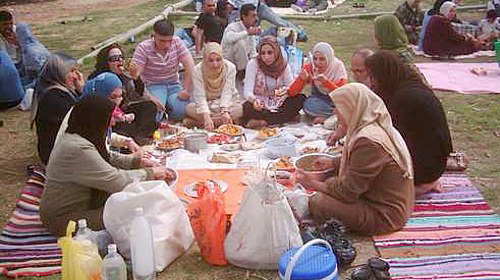
March 22 2008 | By Asso Ahmed and Usama Redha, Los Angeles Times Staff Writers
LAKE DUKAN, IRAQ -- Armed with picnic baskets and dressed in their brightest holiday finery, Iraqi Kurds headed into the hills here Friday to celebrate a cherished holiday that marks the beginning of spring.

Usama Redha / Los Angeles Times
A family digs in at Baghdad's Zawra Park. Under Saddam Hussein, a Sunni Arab, celebrating Nowruz was an act of defiance, but now it is a public holiday.
There was barely an inch to spare around Lake Dukan, north of the Kurdish city of Sulaymaniya, where families gathered by the thousands to grill meat, sing folk songs and dance a traditional line dance called the dabka.
"This year is different," said the newly married Osman Ahmed, who was walking around the lake with his wife. "Iraq in general has become more secure recently, and this adds to our joy."
The holiday known as Nowruz, the Persian New Year, is celebrated by Iraqi Kurds as well as Iranians, Tajiks and Afghans. Under Saddam Hussein, whose Sunni Arab-dominated regime killed thousands of minority Kurds in chemical attacks, celebrating Nowruz was an act of defiance. But since Hussein was ousted in 2003, Iraq's new Shiite Muslim leaders and their Kurdish allies have declared the day a public holiday.
"The situation is getting better by the year, ever since his removal," said Ahmed's wife, Tarza Khalid. "Living standards are going up and thus more people are encouraged" to celebrate.
On the eve of the holiday, the Kurdish hills were alight with the glow of bonfires and hundreds of candles.
On Friday, families headed out of the cities in long parades of honking cars, waving colorful flags through the windows. The secular and the religious picnicked side-by-side, some openly drank alcohol while others knelt in prayer.
Arabs also enjoy celebrating the holiday. Among those by the lake Friday was Hadi Azzawi, a Sunni Arab blacksmith, who fled north three years ago to escape the sectarian killings in Baghdad. He now works in a shop in Sulaymaniya owned by a former customer, who used to drive to Baghdad to place his orders with Azzawi.
"We feel like we are part of this place. There isn't any harassment or anything," he said, sitting in a group of five Arab families. "I do intend to return to Baghdad eventually, but only if I am sure that it is 100% safe."
Encouraged by the ebb in violence, Iraqis in Baghdad were also out in numbers celebrating the holiday. Thousands lined up for a quick pat-down at the entrance to Zawra Park. Inside, families spread their picnic blankets on the scruffy lawn and danced to the beat of drums.
A group of teenage boys stood nonchalantly on a bridge, trying to catch the eye of pretty girls as they walked by and sneak them their phone numbers.
Special correspondent Ahmed reported from Lake Dukan and Times staff writer Redha from Baghdad.


